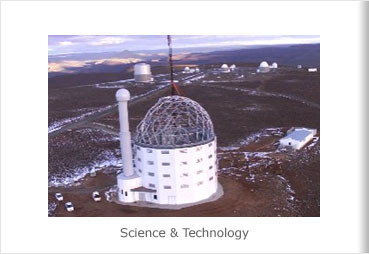
 |
 |
 |
 |
 |
 |
 |
 |
 |

From mosquito-repellent candles to the Southern African Large Telescope (SALT), developments in science and technology in South Africa's first decade of democracy have put the country on the international map.
The range of projects the Department of Science and Technology is involved in is impressive and wide-ranging: biotechnology, information technology, technology for manufacturing, natural resource technology, and technology for poverty reduction.
Of specific interest is that the southern African region has become a premier destination for globally-significant, cutting-edge astronomy projects. In South Africa, SALT at Sutherland in the Northern Cape will be the largest telescope in the southern hemisphere.
Another project the South African Government is actively backing is South Africa's bid to host the Square Kilometre Array (SKA), which will be the world's biggest and most costly telescope, at a billion dollars. The project, involving some 34 institutions in 15 countries, will unfold in two phases: the demonstrator phase until 2007, and the final construction phase beginning in 2011, with final completion set for 2020. South Africa would be the ideal site for the core element of the SKA owing to its geographical location, as well as the capabilities and record of accomplishment to host, support, and contribute to the science that will be generated by this giant radio telescope. Final selection of the site is due to take place in 2006.
Another high-technology sector for South Africa is nuclear power, where the country is leading an international effort to perfect Pebble-Bed Modular Reactor (PBMR) technology. This is regarded as a very strong contender for the next generation of nuclear power technologies from 2010 on, and it is hoped to have a prototype in operation by 2008.
The CSIR (Council for Scientific and Industrial Research) is one of the largest R&D, technology and innovation institutions in Africa, with a track record spanning 60 years. Structured around operational research units and strategic technology centres, the CSIR strives for excellence in all its endeavours to improve the quality of life of South Africa's people and to foster national and international competitiveness. The CSIR concluded an agreement with the Korean Institute for Science and Technology (KIST).
|

